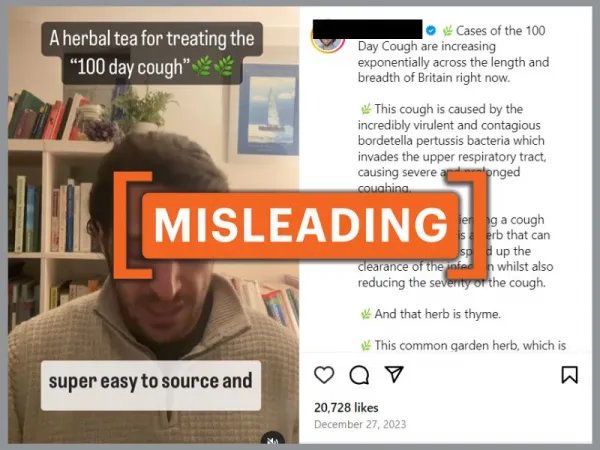By: Nabeela Khan
May 16 2024
 Screenshot of the Reel on Instagram which claims that thyme can cure pertussis. (Source: Instagram/Modified by Logically Facts)
Screenshot of the Reel on Instagram which claims that thyme can cure pertussis. (Source: Instagram/Modified by Logically Facts)
Using thyme to cure pertussis has not been well-documented, and there are no scientific studies to prove it. Experts recommend vaccination.
What’s the claim?
Amid an increase in the cases of whooping cough (also known as pertussis) in the United Kingdom, an Instagram reel is being shared widely to claim that thyme and ginger can help treat the infection. It claims, “Thyme is also a proven herbal anti-biotic, thereby helping to support the clearing of the infection (sic).” It states that the cough is caused by the bordetella pertussis bacteria, which invades the upper respiratory tract, causing prolonged coughing.
The reel recommends adding two teaspoons thyme in hot water, along with grated ginger, and drinking at least three to four cups of the mix in a day. The caption of the reel suggests that this will help “speed up the clearance of the infection whilst also reducing the severity of the cough.”
What we found
Pediatrician and neonatologist Dr. Kishore Kumar from Bengaluru's Cloudnine Group of Hospitals told Logically Facts, “While both thyme and ginger have certain medicinal properties and are used in traditional remedies, their effectiveness against pertussis has not been well-documented through rigorous clinical studies.”
Cautioning against the use of alternative or herbal remedies for serious medical conditions like pertussis, he added, “While natural products like thyme and ginger may have some health benefits, they are not substitutes for evidence-based medical treatments such as antibiotics and vaccination.”
We did not find any clinical studies that looked into the benefits of thyme to treat whooping cough.
Epidemiology professor Hassan Vally from Australia's Deakin University also highlighted an absence of evidence to claim that thyme and ginger can cure pertussis. “Pertussis is a serious bacterial infection that requires prompt medical attention. Delaying medical attention may have serious and potentially life-threatening consequences,” he said.
Alluding to such home remedies suggested on social media, Valley underscored that they may not work but might cause harm.
Vaccination is the key
The World Health Organization (WHO) states, “Pertussis spreads easily from person to person mainly through droplets produced by coughing or sneezing. Vaccination programmes significantly reduce pertussis cases and deaths.”
According to the latest data published by the UK Health Security Agency (UKHSA) on May 9, 2024, the total number of whooping cough cases stood at 2,793. UKSHA also highlighted that whooping cough cases have been rising across England and countries, since December 2023 due to a combination of factors.
A press release from the agency quoted consultant epidemiologist Dr. Gayatri Amirthalingam saying, "Vaccination remains the best defence against whooping cough and it is vital that pregnant women and young infants receive their vaccines at the right time."
UNICEF and WHO, in a joint press release dated February 2, 2024, clearly highlighted that vaccination is the best way to prevent whooping cough. Furthermore, the Centers for Disease Control and Prevention (CDC) recommends whooping cough vaccines for people of all ages.
What is pertussis?
Pertussis is an infectious disease which causes an exhausting cough that can affect everyone. It is considered the most severe in unvaccinated children under the age of one.
According to WHO, “Pertussis is a highly infectious respiratory tract infection. It is characterized by a “hacking” cough, followed by a high-pitched intake of breath or a “whoop” (hence the common name of whooping cough).”
WHO recommends providing all infants with three doses of the pertussis vaccine in infancy and one booster dose in children one to six years of age. The CDC says that it can be a serious condition in babies as “many babies with whooping cough don’t cough at all. Instead, it may cause them to turn blue or struggle to breathe. It may seem like a common cold for the entire illness, not just the beginning.”